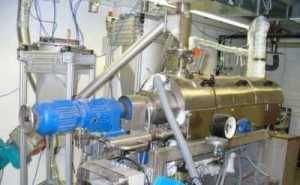German consortium tests new biomass gasification technology, obtains record hydrogen yield
 The 'Zentrum für Sonnenenergie- und Wasserstoff-Forschung' (ZSW) in Baden-Württemberg, Germany, announces [*German] that it has developed a new gasification technology for the production of an energy rich gas from biomass that can be used for the generation of electricy and heat, but also for the production of biohydrogen, biomethane and a series of next-generation synthetic liquid biofuels. Following successful initial tests, the regional government of Baden-Württemberg gave the ZSW and its partners the green light to build a 10MW demonstration plant. The new low-temperature gasification technology allows a much wider range of biomass feedstocks to be used, including wet feedstocks.
The 'Zentrum für Sonnenenergie- und Wasserstoff-Forschung' (ZSW) in Baden-Württemberg, Germany, announces [*German] that it has developed a new gasification technology for the production of an energy rich gas from biomass that can be used for the generation of electricy and heat, but also for the production of biohydrogen, biomethane and a series of next-generation synthetic liquid biofuels. Following successful initial tests, the regional government of Baden-Württemberg gave the ZSW and its partners the green light to build a 10MW demonstration plant. The new low-temperature gasification technology allows a much wider range of biomass feedstocks to be used, including wet feedstocks.In a first stage, the integrated gasification-cogeneration plant will be used for the production of green electricity and heat. In a later phase the production of synthetic liquid and gaseous (transport) fuels will be demonstrated.
Thermochemical conversion is a method to transform low-grade biomass types into a gas which can generate electricity in a gaseous-fuel engine or be used in fuel synthesis. Various conversion techniques are currently being developed, including pyrolysis (heating under exclusion of O2) and gasification (heating in special gasification media). The innovation at the ZSW concentrates on the water vapour gasification of biomass in the presence of a CO2 absorbent. The technology is based on an innovative step in a process called 'Absorption Enhanced Reforming' (AER), which was developed in cooperation with the University of Stuttgart and other European partners. During the gasification process, solid biomass is converted into a hydrogen-rich and carbon-oxide-poor fuel gas with a low tar content by means of integrated gas conditioning. Compared to other gasification processes, the AER technique yields gas with a much higher hydrogen content; pilot tests showed yields of up to 70% hydrogen, an unprecedented level.
This hydrogen-rich raw gas can then be made to follow several conversion routes: (1) towards the production of useable gases (biohydrogen, and biomethane that can fed be into the natural gas grid or used as a natural gas substitute in CNG/LPG vehicles) and (2) towards the production of socalled BTL (biomass-to-liquids), synthetic biofuels via a Fischer-Tropsch synthesis of the raw gas:
 biomass :: bioenergy :: biofuels :: energy :: sustainability :: biomass-to-liquids :: BTL :: gasification :: absorption enhanced reforming :: biohydrogen :: synfuels :: Germany ::
biomass :: bioenergy :: biofuels :: energy :: sustainability :: biomass-to-liquids :: BTL :: gasification :: absorption enhanced reforming :: biohydrogen :: synfuels :: Germany ::The integrated gasification-cogeneration plant uses woody biomass as a feedstock. But, compared to conventional gasification methods, the AER technique considerably reduces the temperatures required for the gasification of biomass. This not only reduces the amount of energy needed to drive the process, it also allows for a much broader range of feedstocks to be used, including wet biomass. Large waste-streams from the agroforestry industry now become available: from grass and straw residues with low ash melting points, which weren't useable until now, to wet wood (leaves, shoots).
This advantage increases the bioenergy potential of the region and has caught the attention of large industries in Baden-Württemberg. Even though production costs and natural gas equivalent prices have not been disclosed, several industries have announced their interest in partnering with the further development of the technology.
"The decision of the regional government is a milestone for this innovative biomass-technology. Cost-competitive energy production in the future as well as rural conservation are served by it", says ZSW-director Dr. Thomas Schott. The government of Baden-Württemberg is currently negotiating with energy companies to find a suitable location for the pilot plant. But in all likeliness, it will be located in what is called the "Schwäbische Alb", a designated "biosphere area" with a large biomass resource.
Image: Pyrolysis reactor for studying the absorption-enhanced conversion of biomass.
 -------------------
-------------------
 Spanish company Ferry Group is to invest €42/US$55.2 million in a project for the production of biomass fuel pellets in Bulgaria.
The 3-year project consists of establishing plantations of paulownia trees near the city of Tran. Paulownia is a fast-growing tree used for the commercial production of fuel pellets.
Spanish company Ferry Group is to invest €42/US$55.2 million in a project for the production of biomass fuel pellets in Bulgaria.
The 3-year project consists of establishing plantations of paulownia trees near the city of Tran. Paulownia is a fast-growing tree used for the commercial production of fuel pellets.









1 Comments:
Sounds like the best bioconversion method ever. If We had these all over the USA we would need nothing but this plus solar and wind. Small scale units, with as many locations as possible would eliminate outages and line loss.
Imagine having all your dry and wet burnable waste directly in the town generator, reducing your electric bill to a fraction of what it is now.
Post a Comment
Links to this post:
Create a Link
<< Home